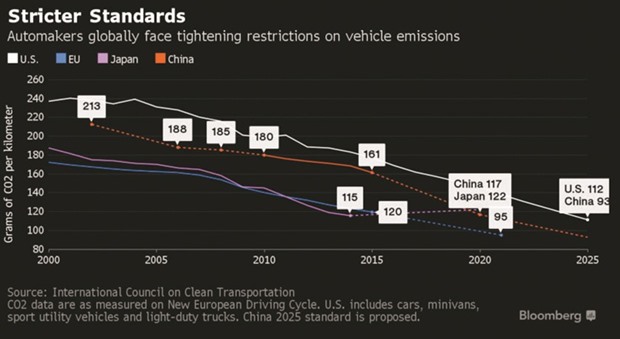Sometimes it can seem like the entire automotive industry is under investigation. Volkswagen is racking up fines and has had seven executives indicted for the tricks it played to enable its diesel-powered vehicles to pass emissions tests. Audi – a VW unit – also is accused of similarly rigging gasoline-fuelled cars. Fiat Chrysler is being investigated by the EPA and Germany’s Daimler has also been sued over diesel emissions. Mitsubishi Motors admitted to doctoring fuel-economy claims. Takata agreed to plead guilty and pay $1bn to settle an investigation over more than 100mn faulty air bags linked to 17 deaths worldwide. The General Motors ignition-switch debacle is blamed for the loss of at least 120 lives and led to $2.1bn in fines and legal settlements with more potentially coming.
Why are so many companies in trouble?
Most of the environmental cases deal with stringent emissions standards put in place by the Environmental Protection Agency in 2001. Carmakers were given until 2010 to comply. Chrysler and the maker of its engines bet they could beat the competition to market. They did so, in 2007, but with a truck allegedly incapable of meeting those standards over its lifetime, according to a consumer lawsuit, which says Chrysler’s diesel Dodge Ram trucks from 2007-2012 were rigged to cheat smog tests.
Then why is VW the poster child for emissions cheating?
Chrysler is accused of having done it first, but VW has already admitted fault and agreed in January 2017 to pay $4.3bn in penalties to the US. That sum is in addition to the $19.1bn that VW must set aside to pay fines and compensate affected customers and dealerships. The German automaker will have to buy back cars and also fund pollution-reduction projects. VW also agreed to pay $1.2bn for a settlement with dealers and still faces additional claims in Germany as well as criminal probes. Chrysler could soon help VW shoulder the reputational burden that comes with diesel cheating. Along with facing suit for allegedly building a standards-violating truck, Chrysler’s received a notification by the US Environmental Protection Agency for violating the Clean Air Act. The company is being investigated by the US Justice Department over both civil and criminal claims.
Is this the first time carmakers have been caught cheating?
Emissions cheating dates back to at least the 1970s, when carmakers were rolling out automobiles that turned off anti-pollution systems when the air conditioning was on. Others had sensors to activate pollution controls only at testing temperatures. In 1973, US regulators accused VW of cheating. It settled with a $120,000 fine. GM paid $45mn in 1995 after being accused of circumventing pollution controls.
Is emissions the only issue?
Not by a long shot. In addition to Takata’s exploding air bags, lawyers and government investigators in recent years have delved into Toyota accelerator pedals, Honda’s underreporting of fatal accidents and injuries, incomplete safety recalls by Fiat Chrysler and overstated fuel economy by Ford, Hyundai Motor and Kia Motors. GM hid changes the company made to its faulty ignition system only to have the undisclosed fix revealed in a deposition by a trial lawyer. Federal safety regulators discovered it later. Similarly, Takata and Honda had settled lawsuits before issuing widespread recalls of the air bag inflators.
What do the different scandals have in common?
Lawyers. Though researchers first uncovered VW’s cheating in September 2015, lawyers followed up with their own investigations of carmakers – first VW, then its Audi and Porsche units, then Mercedes and Fiat Chrysler. Some of the same lawyers behind the VW diesel case also filed the Audi gasoline-engine lawsuit and the Chrysler case and continue to investigate additional potential violators of the US Clean Air Act. Meanwhile, the researchers at West Virginia University who first detected VW’s excess emissions continue to search for pollutant-spewing automobiles.
What’s this doing to the auto industry?
With diesel’s credibility now in question, carmakers are putting more resources into electric vehicles. That kind of innovation is expensive, and the fines they’re facing are potentially huge. VW recently agreed on a deal with employees that will slash as many as 30,000 jobs worldwide to save €3.7bn ($3.9bn) and aid its recovery efforts. With consumer confidence in its brands shaken and profits waning, VW’s ability to make new models that will win back customers is going to be hampered by scandal costs exceeding $23bn.
How do consumers know whom to trust?
Carmakers have won back customers after previous cheating scandals, just not right away. The question for consumers will not only be if or when to trust these automotive brands, but whether to trust new technologies. That’s exactly why it’s so important for VW and other carmakers to figure out their path forward in a future of lower emissions and higher scrutiny.

